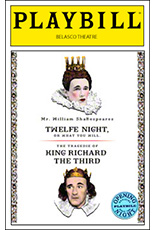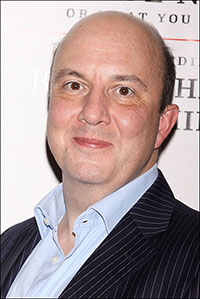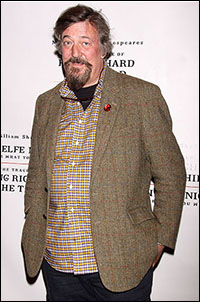
On Nov. 10 — 15 hours after Britain's all-gal Julius Caesar folded its tent at St. Ann's Warehouse and stole away into the Brooklyn night, having triumphantly set the bar for same-sex Bard this season — the all-guy Shakespearean Brits officially retaliated at Broadway's Belasco with a double blast of the Bard: Richard III and Twelfth Night.
There appears to be safety in numbers here, because the result is something of a bang-bang bull's-eye for the recently reactivated Globe Theatre in London. Its first artistic director, Mark Rylance, led the charge to Broadway as the misshapen monster monarch of the first play and as the overheated coquette Olivia of the other.
There's a lot of cross-dressing going on here, as indeed there was in Shakespeare's day, and considerable effort has been made to approximate the arts of that time.
The cross-dressers are not difficult to spot. All the men playing women in the play — true to Shakespeare's time and tradition — seemed to have answered Milton Berle's "Makeup!" call and look as if they were dunked in flour. In elegant floor-length gowns, they glide across the stage with the greatest of ease, as if motorized or on roller blades.
The classical side of Rylance, which he honed and perfected at The Globe, is new to Broadway. He has already knocked off two Tonys in decidedly unclassical situations — in the 2008 revival of Marc Camoletti's Boeing-Boeing and in Jez Butterworth's 2009 Jerusalem — so now he appears to be finally getting down to some brass-tacks Bard, flexing his and his company's acting muscles with wildly different productions.
Rylance's dog, Apache, made his Broadway debut accompanying his master/mistress on an especially grand entrance, and he showed up with him at the press meet-'n'-greet that night at multi-pillared Gotham.
Rylance's Richard III must be the most hilarious—or the only hilarious — one on record; it's evil incarnate, as done by a sputtering, stuttering, doddering buffoon, someone you'd pay no attention to — and should. He's so deep in royal blood that his conscience is numb to himself and to us. In a stunning change of pace, he's a graceful gadfly dipping and diving in the heavy amorous traffic of Twelfth Night.
The latter, which would seem to be less taxing on him, has more playdates than Richard III, but he said the scheduling was not to give him a chance to rest up. "It's just a more popular play," he explained. The combination of the two was his idea.

Buy this Limited Collector's Edition |
Born in Ashford Kent, Rylance came to the U.S. with his parents when he was two, living first in Connecticut for eight years and then Wisconsin, eventually returning to London in 1978 on a RADA scholarship and working at RSC and Stratford-upon-Avon, building and fortifying a reputation as a world-class interpreter of the Bard.
His Anglo-American background well-qualified Rylance to be the first artistic director of The Globe, which came about because of another Anglo-American amalgam whom he saluted in a touching hands-across-the-sea curtain speech.
"He was an American actor. He left this country in the 1950s after the McCarthy hearings and went to London. In 1969 he had the vision that someone should rebuild Shakespeare's Globe Theatre. It took him the last 25 years of his life to convince us English that we should do that. He was helped an enormous amount by friends in England and in America. He died 20 years ago in 1993, three years before we finished The Globe. Everything tonight — the work of our brilliant director Tim Carroll, our co-producer Sonia Friedman, our set designer Jenny Tiramani, our music arranger and composer Claire van Kampen and, indeed, all of our experience comes through that vision — that American vision — that we should pay some attention, perhaps, to Shakespeare's words. He was one of the greatest friends, I think, that Shakespeare would have ever had, and he stands, to my mind, as a memorial to the great friendship that Americans have always had for Shakespeare. So, when you go out into the New York streets tonight, have a thought, of course, for Mr. W.S., the genius, but also for his great friend, Mr. S.W. — Sam Wanamaker."
Rylance, in his signature pork-pie hat with doggie in tow, was the last cast member to file into the pressroom that was set up just inside the entrance of Gotham. Word was that Stephen Fry was receiving only the television interviewers, absolutely no print people at all — but he did relent if you shared the same birthday.
We regaled each other with historical events that happened on "our day" — St. Bartholomew's Massacre, the death of Valentino, the first successful English Channel swim. (Our Oscar-winner is Marlee Matlin, and we also claim Steve Guttenberg.)
A towering, imposing figure, Fry is the latter-day Renaissance Man — actor, writer, humorist, you-name-it — so he's well-placed in Twelfth Night, but he's nobody's fool, and for him to make his Broadway debut as the pompous, gullible, self-deluded Malvolio — to play him so earnestly and elegantly — is an astonishing feat. The character's vow of vengeance at his cruel pranksters pulls the audience over to his side and is a poignant game-changer. "Shakespeare often did that," remarked Fry.
| |
 |
|
| Samuel Barnett | ||
| Photo by Joseph Marzullo/WENN |
"It's funny," he said after a moment of reflection, "in the West End at The Globe, I was Sebastian in Twelfth Night when we were in the U.K. so I was a man and a woman [Queen Elizabeth in Richard III], and, now, I've become two women here. The guy who was doing Viola couldn't do the Broadway transfer because he was doing something else, so I said I'd love to play Viola if they'd have me, and they said yes. I love doing it. There's so much scope. Viola has a lot of heartbreak and longing and lust and comedy — she runs the whole gamut of relations. I love all the scenes. There's something in each scene that I look forward to, which is a real pleasure.
"It is very interesting when you're playing women. I try not to pretend to be a woman. I just try to play what I think the character is feeling and thinking and doing if the stakes are the same. I think it would be a mistake for me to kinda be a woman. You know, an audience isn't stupid. They know we're men in women's clothing. I think they'll go with you as long as you're being true to what's actually in the text."
The congested couplings that happen to Viola are a month in the country, compared to what he had to reach for to do Queen Elizabeth in Richard III, he revealed. "It's the most amazing part. I was very daunted by it. Obviously, I don't have children, and I've never had my children taken from me. It's just one of those things where you say, 'How am I supposed to act that?' But the text helps you, working with Mark helps you, working with Tim Carroll helps you, and now I feel like I've grown into the part — plus, it's lovely to revisit it after having not done it for a few months."
Juggling two women's roles here kept him out of participating in the telecast of the 50th anniversary of the National Theatre in London recently. The French-class scene from The History Boys was excerpted, with author Alan Bennett replacing the late Richard Griffiths. "I was supposed to be in it. I'm seeing it tomorrow at a screening." According to my eyes and ears, there are two completely successful performances of women in this double-bill — Joseph Timms as Queen Anne, the forced bride of Richard III, and Paul Chahidi as Olivia's lady-in-waiting, Maria, in Twelfth Night. Like Bertie Carvel in Matilda The Musical, their femininity is unforced and natural.
"I think it's something to do with our cadences and not trying to lift the voice higher,' Timms suggested. "They have a lot more variety in their voice range."
For Twelfth Night, he slips into manly manic, as Sebastian, the brother that his twin sister Viola is pretending to be. The abounding confusion gets dizzily intense, thanks (he believed) to the ensemble playing. "It's such a positive company and so engaging," Timms remarked. "Every night it's playing, and you're there, and it's alive. It's not dead on the page. I think David Mamet said, 'The best time you'll ever hear a play is when you read it for the first time.' With this approach which is the way our director Tim Carroll works, I think it's the most successful production I've been in about keeping it spontaneous for the audience every night so they see and hear it."
| |
 |
|
| Paul Chahidi | ||
| Photo by Joseph Marzullo/WENN |
He played a woman once before, "when I was 14, at school. That was the last time." He's a bit awed by Broadway: "It's the biggest thrill I've ever had. I didn't know what to expect. I think I was quite nervous to do two Shakespeares in the heart of Commercial Theatre Land because Shakespeare is quite a hard sell. It is in London even, in the West End. But I've just been astonished at how receptive the audiences have been here and how intelligent they are and how much they're enjoying it."
Lanky and dignified, Angus Wright seemed closer off-stage to the cunning Duke of Buckingham than to the clownish Sir Andrew Aguecheek. He exhibited proper swagger-and-dash in the first, "and," he said, finishing the sentence, "idiocy in the second." But he doesn't love one role more than the other. "I love doing Aguecheek because I understand the guy, and playing the comedy is good, but, as double roles go, it's wonderful. I love the intelligence of Buckingham and speaking verse. I speak no verse as Aguecheek, whereas Buckingham's all verse. So that, as a Shakespearean contrast, is great for an actor — to speak verse and then prose. It's a workout!
"Buckingham is a part that requires an intellect because he is 'a witty,' and that Elizabethan term is less about making jokes and humor and more about intelligence and sharp-sighted view about where things are going. So there's a politician in one, and then there's Aguecheek who says, 'I hate politicians.' He doesn't understand the idea of anyone who has an argument about things that isn't about 'Let's fight it out.'
"With Buckingham, what I try to do is to resist the temptation to follow Richard blindly. He's the diplomat with the Machiavellian Richard. He's trying to find a way to deal with the princes — send them off to France or Scotland, get them out of the way. You don't have to kill them. For Buckingham, that's the turning point." Offstage, Liam Brennan has a thick Irish brogue that he doesn't have onstage. As Orsino, he beautifully speaks the famous line that commences the complicated playing-around that follows in Twelfth Night: "If music be the food of love, play on." As Clarence, Richard's luckless and short-lived brother, he doesn't say an awful lot.
"Today was great," he assessed, "very buzzy. We've been previewing a while, but it felt special — two lovely audiences, very warm." And what does one do between Shakespeares? "Eat," he laughed. "Today the break was about an hour and a half so by the time you changed and showered and eaten something, it's time to go again."
As Twelfth Night's Feste, Peter Hamilton Dyer carries the heaviest singing load, and he carries it well. "It's the most musical of his plays,' he noted. "'O Mistress Mine,' the first song, has a traditional arrangement that goes with those words. The other two main songs have been put together. Claire van Kampen, the musical director, found music of the time that she felt would go well with the words from the text."
| |
 |
|
| Stephen Fry | ||
| Photo by Joseph Marzullo/WENN |
Dominic Dromgoole, who is the current artistic director of The Globe, was in attendance.
"We gave birth to the shows last year at The Globe, and we're very happy to have them over here," he offered. "This particular combination of plays was Mark's idea. We'd done Twelfth Night about ten years ago. He wanted to give it a bit more life and give it a longer run — and he wanted to play Richard III as well, and he thought he could do it with one company. It energizes him. He loves the immediacy of contact on Broadway. He's having a conversation between the stage and the audience—it feels to him like The Globe. He feeds on anything the audience does."
Imperious Greg Dawson, owner/emperor of the late, deeply lamented Barrymore's Restaurant, can be spotted at the very start of Richard III escorting patrons to their seats on stage. (There are double-decker seating on both sides of the stage flanking and framing the action.) "We call this role Stage Seater," he explained, "and I do believe I'll get a Tony nomination out of it." Head usher at the Winter Garden, he counts this as just a temporary gig. "I'll be here for the whole run, and then I will be going back to the newly refreshed Winter Garden for Rocky: Das Musical."
The turn-out for both openings, despite the storm-clouds, was quite starry. BFFs Matthew Broderick and Kenneth Lonergan arrived together for the first helping. Broderick just got a gig introducing movies on Turner Classic Movies; Lonergan said he was writing movies — specifically, a new adaptation of "Howard's End" for the BBC. (I told him to watch out for that bookcase.) They left after Play One to join their working wives: Mrs. Broderick (Sarah Jessica Parker) is in The Commons of Pensacola (a play at Manhattan Theatre Club's City Center space), and Mrs. Lonergan (J. Smith Cameron) is the Juno of Juno and the Paycock at The Irish Rep. Paula Prentiss and Richard Benjamin, newlyweds 52 years later, caught both plays the same day and made a point of personally complementing the actors at the party. (Chahidi was particularly thrilled by Prentiss' praise of his Maria.) It is believed to be the first Sunday that The Benjamins spent all day in a theatre since Dec. 7, 1975, when they gave all three plays in The Norman Conquests their Broadway premieres.
Geoffrey Rush went the six-hours-of-Shakespeare distance as well and extended lengthy congratulations to Rylance. While having an intermission cigarette at the first play, he said as soon as his son gets through with high school (which is soon) he'll be open to doing a play in New York. His last (and first) time on Broadway, Exit the King, got him the Tony — and a variation of that looniness earned him much praise at BAM for Diary of a Madman. His latest film, "The Book Thief," bowed Friday.
Quite a few stars skipped the matinee because they had matinees of their own to do, but they showed up for the evening's Twelfth Night. Among them were Rylance's La Bete co-star, David Hyde Pierce, fresh off The Landing at the Vineyard; Zachary Quinto and Celia Keenan-Bolger, bro and sis in The Glass Menagerie; Tovah Feldshuh, in what looked like her Marathon jogging gear, arriving with hubby, son and daughter from playing Pippin's current high-flying granny; Christian Carmargo, Rylance's stepson-in-law plying the family trade of Broadway Shakespeare as Mercutio in Romeo and Juliet; Victoria Clark, a loose Snow Goose anticipating the big cast-reunion concert of Titanic: The Musical at Avery Fisher Hall Feb. 17, 2014 ("I hope we get a little rehearsal").
Joe DiPietro said he's, at long last, figured out who killed '20s film director William Desmond Taylor. His latest play, a 17-character Hollywood murder mystery-satire titled The Unfortunate Murder of William Desmond Taylor, rates a reading in December at the La Jolla Playhouse, under the direction of Christopher Ashley. The very unusual suspects include Mabel Norman (of Mack and Mabel), Mary Miles Minter and the mother of Mary Miles Miner, so you'd be smart to dial M for Murder.
Doubling the sparkle for the openings were America Ferrera from "Ugly Betty," Bethany and beyond; Buck Henry; a wildly hirsute Josh Hamilton; director Michael Mayer, busy touching up Rigoletto at The Met before he focuses on Neil Patrick Harris and Hedwig and the Angry Inch for Broadway in the spring; Slate Holmgren from TV's "Elementary"; Doris Roberts, out and about and looking lovely after just turning 88; Yael Stone, another Aussie best-known for "Orange Is the New Black"; Alan Cox, And Away We Go playwright Terrence McNally and After Midnight producer Tom Kirdahy; Sigourney Weaver in tinted shades; Joan Rivers; The Post's Michael Riedel; director-choreographer Kathleen Marshall, content this night to being the wife of Mr. Producer (Scott Landis); directors Moises Kaufman and Joe Mantello; music mogul Clive Davis; comedienne Lisa Lambert; Taboo Tony nominee Euan Morton and Matthew Schechter.
Both shows, by the way, concluded with curtain calls that are exuberantly danced — the best curtain calls since the wave after wave of actors lapped up on The Coast of Uptopia. Jack O'Brien, who directed that, will be pea-green with envy. Hopefully, he won't have his large Macbeth cast do Highland flings with their bows...

















































































































